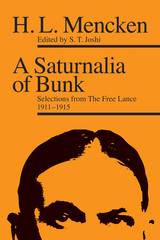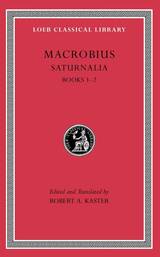
H. L. Mencken’s reputation as a journalist and cultural critic of the twentieth century has endured well into the twenty-first. His early contributions as a writer, however, are not very well known. He began his journalistic career as early as 1899 and in 1910 cofounded the Baltimore Evening Sun. The next year he initiated a column—The Free Lance—that ran six days a week for four and a half years, until the Sun discontinued it, partially in response to Mencken’s controversial defense of Germany during World War One.
In this early forum for his renowned wit, Mencken broached many of the issues to which he would return again and again over his career, establishing himself as a fearless iconoclast willing to tackle the most divisive subjects and apply a heady mix of observation, satire, and repartee to clear away what he regarded as the “saturnalia of bunk” that clouded American thinking. The Free Lance reveals Mencken at his scintillating best as a journalist, polemicist, and satirist.
These columns are collected here for the first time, edited and annotated by Mencken expert and critic S. T. Joshi. This extraordinary collection is an invaluable resource for Mencken scholars and fans and provides an entertaining immersion into the early twentieth-century American zeitgeist.

An antiquarian’s festival.
The Saturnalia, Macrobius’ encyclopedic celebration of Roman culture written in the early fifth century AD, has been prized since the Renaissance as a treasure trove of otherwise unattested lore. Cast in the form of a dialogue, the Saturnalia treats subjects as diverse as the divinity of the Sun and the quirks of human digestion while showcasing Virgil as the master of all human knowledge from diction and rhetoric to philosophy and religion.
The new Latin text is based on a refined understanding of the medieval tradition and improves on Willis’ standard edition in nearly three hundred places. The accompanying translation—only the second in English and the only one now in print—offers a clear and sprightly rendition of Macrobius’ ornate Latin and is supplemented by ample annotation. A full introduction places the work in its cultural context and analyzes its construction, while indexes of names, ancient works cited in both text and notes, and topics make the work more readily accessible than ever before.

An antiquarian’s festival.
The Saturnalia, Macrobius’ encyclopedic celebration of Roman culture written in the early fifth century AD, has been prized since the Renaissance as a treasure trove of otherwise unattested lore. Cast in the form of a dialogue, the Saturnalia treats subjects as diverse as the divinity of the Sun and the quirks of human digestion while showcasing Virgil as the master of all human knowledge from diction and rhetoric to philosophy and religion.
The new Latin text is based on a refined understanding of the medieval tradition and improves on Willis’ standard edition in nearly three hundred places. The accompanying translation—only the second in English and the only one now in print—offers a clear and sprightly rendition of Macrobius’ ornate Latin and is supplemented by ample annotation. A full introduction places the work in its cultural context and analyzes its construction, while indexes of names, ancient works cited in both text and notes, and topics make the work more readily accessible than ever before.

An antiquarian’s festival.
The Saturnalia, Macrobius’ encyclopedic celebration of Roman culture written in the early fifth century AD, has been prized since the Renaissance as a treasure trove of otherwise unattested lore. Cast in the form of a dialogue, the Saturnalia treats subjects as diverse as the divinity of the Sun and the quirks of human digestion while showcasing Virgil as the master of all human knowledge from diction and rhetoric to philosophy and religion.
The new Latin text is based on a refined understanding of the medieval tradition and improves on Willis’ standard edition in nearly three hundred places. The accompanying translation—only the second in English and the only one now in print—offers a clear and sprightly rendition of Macrobius’ ornate Latin and is supplemented by ample annotation. A full introduction places the work in its cultural context and analyzes its construction, while indexes of names, ancient works cited in both text and notes, and topics make the work more readily accessible than ever before.
READERS
Browse our collection.
PUBLISHERS
See BiblioVault's publisher services.
STUDENT SERVICES
Files for college accessibility offices.
UChicago Accessibility Resources
home | accessibility | search | about | contact us
BiblioVault ® 2001 - 2024
The University of Chicago Press









